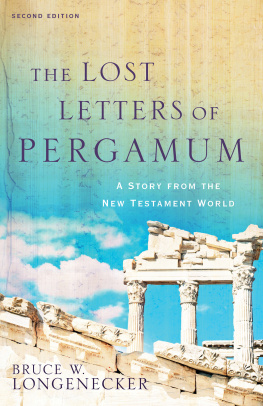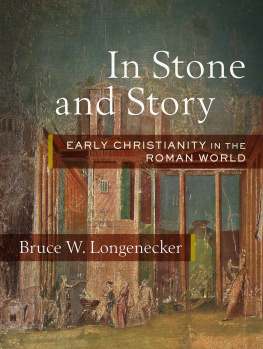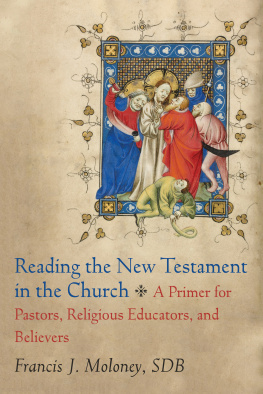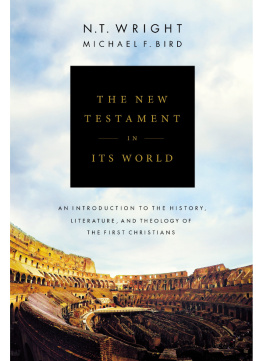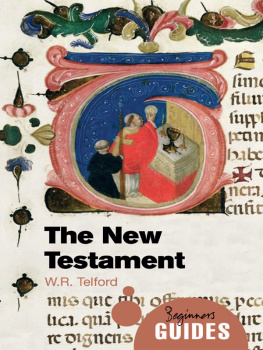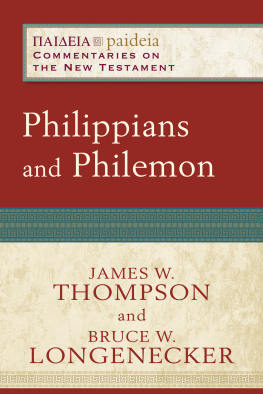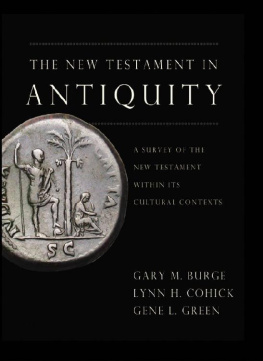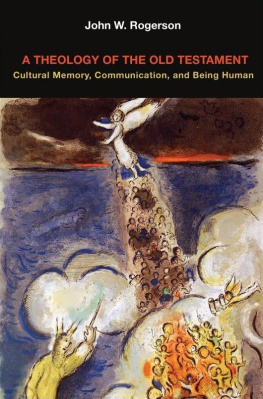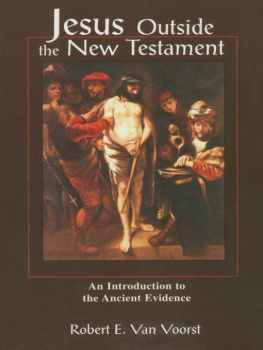Copyright Page
2003, 2016 by Bruce W. Longenecker
Published by Baker Academic
a division of Baker Publishing Group
P.O. Box 6287, Grand Rapids, MI 49516-6287
www.bakeracademic.com
Ebook edition created 2016
All rights reserved. No part of this publication may be reproduced, stored in a retrieval system, or transmitted in any form or by any meansfor example, electronic, photocopy, recordingwithout the prior written permission of the publisher. The only exception is brief quotations in printed reviews.
Library of Congress Cataloging-in-Publication Data is on file at the Library of Congress, Washington, DC.
ISBN 978-1-4934-0500-8
Scripture quotations are from the Holy Bible, New International Version. NIV. Copyright 1973, 1978, 1984, 2011 by Biblica, Inc. Used by permission of Zondervan. All rights reserved worldwide. www.zondervan.com
Praise for the First Edition
Using the time-honored form of a collection of lettersone thinks of the collected letters of Pliny the Younger, many from the same area and roughly the same time as these fictive missivesLongenecker provides, by means of an informative and delightful fiction, a remarkably clear and accurate picture of Christian existence in the eastern Mediterranean world of the first century. One comes away from this booka historical novel in the best senseboth charmed and informed. It is a thoroughly delightful read, from which both beginners and experts will profit.
Paul J. Achtemeier , Union Theological Seminary in Virginia
Longeneckers Letters present in a fascinating and compelling way the contexts of Second Temple Judaism and Greco-Roman urban life. And the narrative he weaves is not only believable but also engaging, both academically and personally. This untraditional presentation deserves a wide readership among all concerned more traditionally with the ethos of New Testament backgrounds.
Joel B. Green , Fuller Theological Seminary
Through the device of an extended correspondence between the evangelist Luke and Antipas, a resident of Pergamum, Bruce Longenecker brings early Christianity to life. The characters are vivid and believable, and they introduce the reader to a rich historical and cultural context. Those familiar with early Christianity will admire the imaginative way Longenecker builds on the best of modern scholarship, and those new to the field will learn a good deal as they eavesdrop on this conversation. This book is both a delight to read and a reliable guide to the beginnings of Christianity.
Frederick J. Murphy , College of the Holy Cross
A savvy and creative introduction to the New Testament world, disguised as a collection of lost letters between Luke and several well-positioned members of Roman society. The genius of the book lies in its fusion of current New Testament scholarship with a very plausible, personal narrative: the sobering story of one mans shift in allegiance from Caesar to Jesus. Along the way we overhear pagan reactions to Jesuss message and endearing stories from household churches; we sense the perils of sea travel and witness the horrors of the Roman games; we identify with privileged benefactors and hurt for subsistence farmers. Anyone hunting for a reliable, if not always comfortable, guide to the dangerous world of first-century Roman Christianity should be glad these papers were finally discovered.
Bruce Fisk , Westmont College
This fictional correspondence is not true, but it certainly could have been. Longenecker writes a very engaging account of several characters who, in their different ways, came to experience and respond to the risen Jesus Christ through Lukes narrative. I was especially moved by the character of Antipas as he is ennobled by being transformed from a Roman dignitary into a model of Christian self-sacrifice.
Stanley E. Porter , McMaster Divinity College
Dedication
For our son Callum:
May the narrative of your life be marked out by honor
Contents
Cover
Title Page
Copyright Page
Endorsements
Dedication
Authors Preface
Editors Preface: The Discovery
L ETTER C OLLECTION As One Nobleman to Another
L ETTER C OLLECTION A Personal Request
L ETTER C OLLECTION To Honor the Emperor
L ETTER C OLLECTION They Proclaim a Different Lord
L ETTER C OLLECTION The Reputations of Three Men
L ETTER C OLLECTION Jesus Seems a Curious Figure
L ETTER C OLLECTION Jesuss Naive and Irresponsible Views
L ETTER C OLLECTION Communities of Support and Fellowship
L ETTER C OLLECTION The Contexts Determined the Contents
L ETTER C OLLECTION A Complete Reversal of Lifestyle
L ETTER C OLLECTION A Conduit of Blessing for Many
L ETTER C OLLECTION The Gods Had Other Plans
L ETTER C OLLECTION May His Will Be Done
L ETTER C OLLECTION The Possessions of Our Common Creator
Editors Postscript
Appendix A: Maps
Appendix B: Characters
Appendix C: Historical and Fictional Aspects of the Narrative
Back Cover
Authors Preface
The story you are about to encounter explores what might have occurred during the final year in the life of a man named Antipas. We know about Antipas from the book of Revelation. There we learn that he was martyred for his faith in Jesus Christ in the city of Pergamum. So we read in Revelation 2:1213:
To the angel of the church in Pergamum write:
These are the words of him who has the sharp, double-edged sword. I know where you livewhere Satan has his throne. Yet you remain true to my name. You did not renounce your faith in me, even in the days of Antipas, my faithful witness, who was put to death in your citywhere Satan lives.
There must have been an intriguing series of events leading to Antipass punishing death. Those events, however, have been lost in the sands of time. We will never know who Antipas was or the episodes that provoked his martyrdom. But we can speculate. And that is what transpires in this storya story that arises from one supposition, one fact, and one tradition.
The supposition is simple: that the Antipas mentioned in Revelation 2:13 had been named after Herod Antipas, the son of Herod the Great and pro-Roman tetrarch who reigned over Galilee during the time of Jesuss ministry.
The fact is equally simple: that this Antipas died as a martyr for Christ in Pergamum, where pro-Roman sentiment and emperor worship were rampanta fact alluded to in Revelation, which speaks of Pergamum as the place where Satan has his throne.
Add the supposition to the fact, and a protonarrative emerges of one who began life dedicated to the advancement of Rome and ended his life as one perceived to be an enemy of Rome. Add to this the ancient tradition about Antipass gruesome martyrdom (narrated later in this book), and the narrative virtually writes itself. A storyteller needs only to fill in the blankssomething I seek to do in a historically reliable fashion throughout the story you are about to encounter.

The ancient philosopher Aristotle once wrote, The perfect friendship is that between good men, alike in their virtue. The following narrative explores some of the dynamics of friendship, goodness, virtue, and honor in the ancient world of the Roman Empire, in which Jesus and his first followers proclaimed the message of a different empire (the empire of God) and enacted distinctive forms of friendship, goodness, virtue, and honor.

